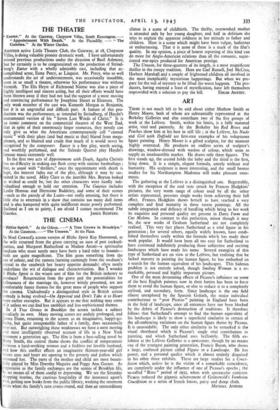THE CINEMA
IN Noel Coward's screen version of Blithe Spirit Kay Hammond, as the wife returned from the grave carrying an aura of past cocktail- parties, and Margaret Rutherford as Madam Arcati—a spiritualist medium who must surely once have been a hard rider to hounds— both are quite magnificent.. The film gains something from the use of colour, and the camera (turning cunningly from the medium's crystal to the sandwich 'her hearty appetite demands) often neatly underlines the wit of dialogue and characterisation. But wonder if Blithe Spirit is the wisest sort of film for the British industry to produce? Resurrection from the grave and the potentialities for callousness of the marriage tie, however wittily presented, are not comfortably funny themes for the great mass of people who support the cinema. Undoubtedly a .distinguished style in British screen comedy is being evolved—On Approval and Don't Take it to Heart were earlier examples. But it appears to me that nothing may come of it unless we can find less snobbish and less sophisticated themes.
In A Tree Grows in Brooklyn the screen tackles a subject peculiarly its own. Many moving scenes are unduly prolonged, and James Dunn, returning to the screen as an imaginative, happy-go- lucky, but quite irresponsible father of a family, does occasionally over-act. But outweighing these weaknesses we have a most moving and most intelligently observed account of life in a New York tenement a generation ago. The film is from a best-selling novel by Betty Smith, the central theme shows the conflict of temperament between a hard-working woman and a feckless yet lovable husband, and how this conflict affects an imaginative thirteen-year-old girl whose eyes and heart are opening to the poverty and pathos which surround her. The parts of the mother and child are most beauti- fully played by Miss Dorothy Maguire and Peggy Ann Garner. As impressive as the family exchanges are the scenes of Brooklyn life, by no means all of them sordid nr depressing. We see the Saturday shopping routine, the cautions hospitality of the insurance agent's visit, getting new books from the public library, washing the tenement stairs when the family's turn comes round, and then an extraordinary
climax in a scene of childbirth. The thrifty, overworked mother is attended only by her young daughter, and half in delirium she tries to explain the apparent coldness in her attitude to father and children. Here -is a scene which might have been vulgar, ludicrous or embarrassing. That it is none of these is a mark of the film's quality. In my opinion, a piece of honest reporting of this kind can do more for Anglo-American relations than all the romantic, sugar- Coated war-epics produced for American prestige.
The Unseen, for three-quarters of its length, is a most magnificent thriller in the creepy tradition. Here are Gail Russell, Joel McCrea, Herbert Marshall and a couple of frightened children all involved in the most inexplicably mysterious happenings. But when we pre- pare for the veil of mystery to be lifted the worst happens. The pro- ducers, having enjoyed a feast of mystification, have left themselves unprovided with a solution to pay the bill. EDGAR ANSTEY.


























 Previous page
Previous page